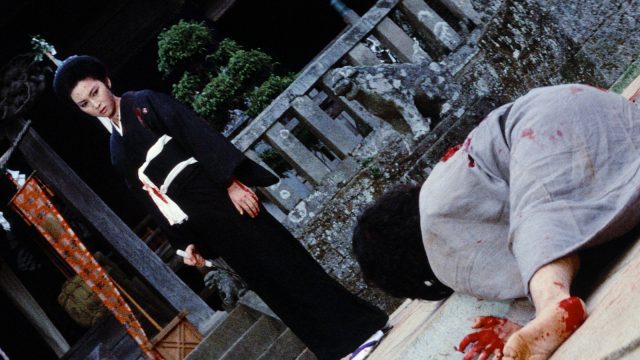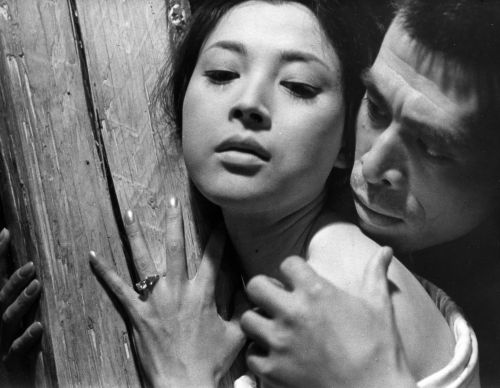
Meiko Kaji reprises her role as an avenging angel-demon in LADY SNOWBLOOD: LOVE SONG WITH VENGEANCE
LADY SNOWBLOOD: LOVE SONG OF VENGEANCE (修羅雪姫 怨み恋歌) (SHURAYUKIHIME URAMI RENKA) (Toshiya Fujita, 1974)
Japan Society
333 East 47th St. at First Ave.
Saturday, February 11, 4:30
Series runs February 10-12
212-715-1258
www.japansociety.org
 Japan Society prepares for Valentine’s Day with the awesome weekend series “Cruel Beauty: A Romantic Weekend with Meiko Kaji,” paying tribute to the legendary genre actress and pop singer, who will turn seventy in March, by screening five of her films February 10-12. “Japanese movie stars don’t get much more iconic than actress Meiko Kaji,” guest curator Marc Walkow writes in a program note. “She remains an inimitable presence in Japanese cinema, and an icon who continues to inspire filmmakers and audiences around the world.” The series gets under way Friday night with the international premiere of Kinji Fukasaku’s 1975 three-part yakuza film New Battle without Honor and Humanity: The Boss’s Head and also includes Teruo Ishii’s Blind Woman’s Curse, Shunya Ito’s Female Prisoner Scorpion: Beast Stable, and Yasuharu Hasebe’s Stray Cat Rock: Sex Hunter, works that show off Kaji’s skills in contemporary and historical action movies. One of her most intense roles is Lady Snowblood, based on the manga by Kazuo Koike (Lone Wolf and Cub) and illustrator Kazuo Kamimura. Japan Society is screening the second film in the duology, 1974’s Lady Snowblood: Love Song of Vengeance, on February 11 at 4:30. In the first film, set during the Meiji Period of the late nineteenth century, Yuki Kashima is born in prison, her dying mother declaring her to be an asura demon who will avenge the murder of her father and brother and the mother’s rape. The cinematography pays tribute to its manga roots, with impressively composed shots that one can almost see on the page, the pacing between wide-angle and closeup echoing the rhythm of panels and frames. In the second film, Yuki, known as Lady Snowblood, has become a coldhearted master assassin who kills virtually without emotion. Hired by Seishiro Kikui (Shin Kishida) to recover an important document, she poses as a maid to infiltrate the home of anarchist Ransui Tokunaga (Juzo Itami) but soon finds herself in the middle of a conspiracy and coverup that could bring down the corrupt government following the Russo-Japanese War. Allying herself with Ransui’s hot brother, Shusuke (Yoshio Harada), she wields her sword with skillful abandon, leaving an ever-growing pile of bodies in her wake.
Japan Society prepares for Valentine’s Day with the awesome weekend series “Cruel Beauty: A Romantic Weekend with Meiko Kaji,” paying tribute to the legendary genre actress and pop singer, who will turn seventy in March, by screening five of her films February 10-12. “Japanese movie stars don’t get much more iconic than actress Meiko Kaji,” guest curator Marc Walkow writes in a program note. “She remains an inimitable presence in Japanese cinema, and an icon who continues to inspire filmmakers and audiences around the world.” The series gets under way Friday night with the international premiere of Kinji Fukasaku’s 1975 three-part yakuza film New Battle without Honor and Humanity: The Boss’s Head and also includes Teruo Ishii’s Blind Woman’s Curse, Shunya Ito’s Female Prisoner Scorpion: Beast Stable, and Yasuharu Hasebe’s Stray Cat Rock: Sex Hunter, works that show off Kaji’s skills in contemporary and historical action movies. One of her most intense roles is Lady Snowblood, based on the manga by Kazuo Koike (Lone Wolf and Cub) and illustrator Kazuo Kamimura. Japan Society is screening the second film in the duology, 1974’s Lady Snowblood: Love Song of Vengeance, on February 11 at 4:30. In the first film, set during the Meiji Period of the late nineteenth century, Yuki Kashima is born in prison, her dying mother declaring her to be an asura demon who will avenge the murder of her father and brother and the mother’s rape. The cinematography pays tribute to its manga roots, with impressively composed shots that one can almost see on the page, the pacing between wide-angle and closeup echoing the rhythm of panels and frames. In the second film, Yuki, known as Lady Snowblood, has become a coldhearted master assassin who kills virtually without emotion. Hired by Seishiro Kikui (Shin Kishida) to recover an important document, she poses as a maid to infiltrate the home of anarchist Ransui Tokunaga (Juzo Itami) but soon finds herself in the middle of a conspiracy and coverup that could bring down the corrupt government following the Russo-Japanese War. Allying herself with Ransui’s hot brother, Shusuke (Yoshio Harada), she wields her sword with skillful abandon, leaving an ever-growing pile of bodies in her wake.
The sequel, a kind of Eastern spaghetti Western, is not nearly as focused as the original, with inexplicable plot twists (especially the inconsistent use of guns), but the violence is extreme and beautiful; blood doesn’t just gusht out of Yuki’s victims but sizzles on the soundtrack. In the opening scene, Lady Snowblood is ambushed at a cemetery as she mourns her mentor; after dispatching everyone, she coolly drinks from the pond where one dead man’s blood has spilled, the taste of vengeance sweet indeed. The film features brutal torture and a propensity for stabbing eyes, as if pounding into our heads that justice is blind. The villains also are spreading the plague, as various people’s faces and bodies become grotesque and deteriorate, referencing the effects of the nuclear bombs dropped on Hiroshima and Nagasaki. (Pay close attention to the final blood splatter.) Although not nearly as good as its predecessor, Lady Snowblood: Love Song of Vengeance is still a must-see, particularly for the formidable Kaji, an avenging angel-demon and preying tiger who served as the direct inspiration for Black Mamba (Uma Thurman) in Quentin Tarantino’s Kill Bill Vol. I (and she even sings some of the songs). All of the films in the Japan Society series are sequels or follow-ups, but don’t let that scare you off. “In the world of Japanese genre filmmaking — samurai and yakuza films, exploitation movies, horror films — sequels were very rarely linked to each other by a continuing storyline,” Walkow explains. “Viewers needn’t be worried if they haven’t seen the original entries; all the films stand on their own.”


 Adapted from a short story by Junichirô Tanizaki, IREZUMI, the opening-night selection of the Japan Society’s “Mad, Bad . . . & Dangerous to Know” series, was one of the first Japanese exploitation films shot in color. Ayako Wakao stars as Otsuya, a pawnbroker’s daughter who aches to get away from her boring life. She convinces her father’s apprentice, the meek Shinsuke (Akio Hasegawa), to steal the shop’s money and run away with her, but the plan goes awry when she is sold into sexual slavery to Tokubei (Asao Uchida). Enraptured by her skin, Seikichi (Gaku Yamamoto) marks her for Tokubei by tattooing a huge spider across her back, promising it will bring her special power over men. Soon Otsuya is exacting bloody revenge with the help of the poor, misguided Shinsuke. Directed by Yasuzo Masumura, who also worked with Wakao on such films as MANJI and RED ANGEL (which screens April 1), IREZUMI is a dark, compelling tale that is not afraid to break out of genre conventions. The screening will be followed by the Dressed to Kill! party, where attendees are encouraged to come in costume as their favorite cinematic femme fatale.
Adapted from a short story by Junichirô Tanizaki, IREZUMI, the opening-night selection of the Japan Society’s “Mad, Bad . . . & Dangerous to Know” series, was one of the first Japanese exploitation films shot in color. Ayako Wakao stars as Otsuya, a pawnbroker’s daughter who aches to get away from her boring life. She convinces her father’s apprentice, the meek Shinsuke (Akio Hasegawa), to steal the shop’s money and run away with her, but the plan goes awry when she is sold into sexual slavery to Tokubei (Asao Uchida). Enraptured by her skin, Seikichi (Gaku Yamamoto) marks her for Tokubei by tattooing a huge spider across her back, promising it will bring her special power over men. Soon Otsuya is exacting bloody revenge with the help of the poor, misguided Shinsuke. Directed by Yasuzo Masumura, who also worked with Wakao on such films as MANJI and RED ANGEL (which screens April 1), IREZUMI is a dark, compelling tale that is not afraid to break out of genre conventions. The screening will be followed by the Dressed to Kill! party, where attendees are encouraged to come in costume as their favorite cinematic femme fatale.